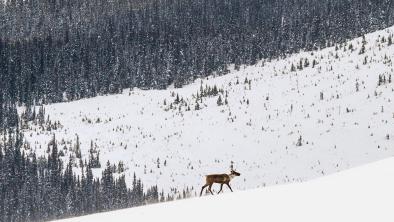B.C. government releases southern mountain caribou recovery plans
Charlotte Dawe

First Nations caribou recovery plan a success, while B.C. plan is a flop
VANCOUVER - B.C.’s long-awaited southern mountain caribou recovery agreements have been released — one is great and the other falls flat. Saulteau and West Moberly First Nations have negotiated a strong agreement to recover the central group of caribou by preserving their forest habitat while the province belly flops on effective plans for the rest of caribou groups throughout the province.
“West Moberly and Saulteau First Nations are the reason caribou in the central group have a future,” said Wilderness Committee Conservation and Policy Campaigner Charlotte Dawe. “As a result of being at the table for months on end negotiating a strong recovery plan with lots of habitat protection, their commitment to saving this species is a true inspiration.”
The partnership agreement is between West Moberly and Saulteau First Nations, the federal government and provincial government. It’s included habitat protection as a key priority including designating a new protected area for caribou. The two First Nations will take the lead in planning for and initiating an Indigenous Guardians Program.
“Forest habitat protection is the key thing needed for any plan to be successful. It’s also the last thing the province wants to do,” said Dawe. “To see that Saulteau and West Moberly First Nations have managed to get the province to agree to a plan that will actually protect critical habitat necessary for survival is groundbreaking. I applaud them.”
Unfortunately, the plan for the rest of B.C.’s southern mountain caribou groups doesn’t increase protection of forested habitat. The bilateral agreement between B.C. and Canada encompasses the rest of the southern mountain in the province, in particular, the northern and southern groups.
“The bilateral agreements between the governments of B.C. and Canada miss the mark,” said Dawe. “I predict we’ll continue to see logging in critical habitat under this plan and caribou numbers will continue to dwindle ever closer to extinction.”
The bilateral agreement merely outlines plans to develop plans to reduce habitat disturbance — but doesn’t actually protect additional forest habitat. There’s a focus on predator and prey species killing, including continued wolf and moose kills.
“It’s always maddening to see recovery plans with wording like ‘we will plan to make more plans.’ When it comes to habitat protection, we don’t need more planning, we need off-limit areas and protected habitat,” said Dawe.
A public comment period will be ongoing until April 26, 2019. The public is encouraged to write in regarding their opinions and suggestions on the partnership agreement with Saulteau and West Moberly First Nations and the bilateral agreement.
–30–
For more information, please contact:
Charlotte Dawe | Conservation and Policy Campaigner, Wilderness Committee
778-903-3992, charlotte@wildernesscommittee.org


